This project is made possible through the partnership of WATER CHARITY and the NATIONAL PEACE CORPS ASSOCIATION. ![]()
This project has been completed. To read about the conclusion, scroll down to the bottom of this page.
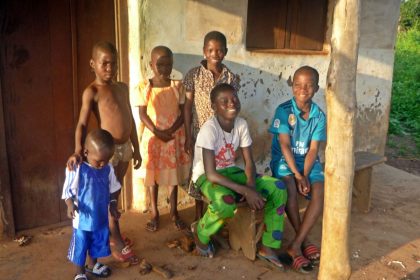 Location
Location
Affem Kabyé, Centrale Region, Togo, West Africa
Community Description
Affem Kabyé, located north of the town of Tchamba, in the Centrale region of Togo and approximately 8 km from the Benin border, is a large village of roughly 4,000 inhabitants. Most are subsistence farmers cultivating mainly maize, yams, and soy, and some garden vegetables such as onions, tomatoes, and various leafy greens. Food crop production seems to be sufficient to satisfy most households’ needs year-round, hence food insecurity is not a concern for most though a varied diet and particularly protein is lacking. The lack of access to regional markets inhibits farmers from producing excess yield for what could be important export crops and a source of much-needed cash.
The ethnic make-up is predominantly Kabyé, Tchamba, and Fulani, with Fulani present in both nomadic and sedentary populations. Water sources are mainly the typical shallow open wells to depths of 7-10 meters, of poor quality and most are non-existent during the peak of the dry season (February to mid-March). There are 5 year-round borehole wells operated by pedal pumps that appear to be functioning. Rivers in the region are used for consumption and household needs by those populations living outside of Affem Kabyé.
The health clinic is a 7-room cement block structure, built-in 1998 by Plan International. At the time of construction, a shallow, open 7-meter well was dug serving as the sole water source until the dry season when clinic staff hauls water from village wells. The clinic is without power, thus another “birth by flashlight” center for those women arriving at night. The building was plumbed for running water. However, a septic tank was never installed and there is no water supply to the building. There is a gas-powered refrigerator.
Problem Addressed
The health clinic is serving a larger population than the official village of Affem Kabyé including the outlier villages and occasionally the frontier population between Togo and Benin. A clinic with a newly installed borehole well exists at around 5 km from Affem Kabyé. However, the inhabitants closest to this newly opened clinic prefer to frequent the Affem Kabyé clinic due to the familiarity of the staff.
The open well was enclosed several years after opening and the standard metal water tower, polyethylene tank and hand pump system installed. However, the water system was never hooked up to the clinic. The well runs dry for roughly four months of the year requiring the staff, patients, and relatives of patients to haul water prior to treatment. The water is generally unpotable and requires bleach treatment. Female relatives of women giving birth are required to provide water during and post-birth, and, as women usually fetch water, all-female patients are typically asked to provide water for themselves and the clinic staff.
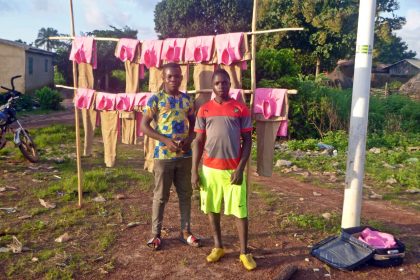 Project Description
Project Description
This project is to build a borehole well for the clinic. Under the guidance of the Department of Hydraulics and Sanitation’s regional office in Sokode and with support from the Ministry of Health regional director, who identified clinics with the most critical need, and a local drilling company, this project proposes to drill a 60- to 100-meter borehole well at the clinic, equipped with the following:
• An electric submersible pump,
• a 4.5-meter high cement block water tower,
• a 2 meter**3 polyethylene tank, and
• piping to the main intake valve at the clinic
The submersible pump will be run using a gas-powered generator as there is currently no electric power in the community. The local drilling company selected, Plomberie Génerale de Réalisation de Forage, in operation since 1998 and based in Tchamba, has extensive experience drilling deep borehole wells throughout Togo and regionally in Burkina Faso, Benin, and Nigeria.
Project Impact
Number of people affected by the project: 4,500
Project Administration
This project will be managed by Anne Jeton, hydrologist and Returned Peace Corps Volunteer (RPCV), Burkina Faso (’82-’85) and Returned Peace Corps Response Volunteer (RPCRV), Togo (’16 -’17).
Anne was sent to Togo on behalf of Water Charity to develop and administer new projects, and to coordinate with the Peace Corps.
Monitoring and Maintenance
Along with staff from the Department of Hydraulics and Sanitation who will monitor the well “indefinitely” (the well data becomes part of the official borehole well database, and as such is included in periodic field monitoring by technicians based in each Prefecture), the contract for well drilling states a one-year guarantee provided by the drilling company. Problems with pump and borehole functioning are typically resolved in the first month of use.
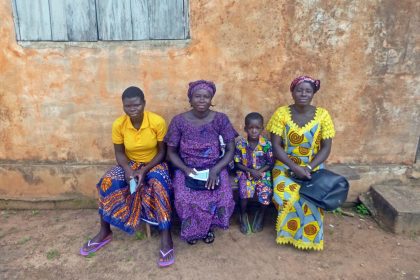 Proper screening of the borehole and submersible pump placement relative to the static water table often mitigates the most common problems. However, any mechanical problems surfacing in the first year will be the responsibility of the drilling company.
Proper screening of the borehole and submersible pump placement relative to the static water table often mitigates the most common problems. However, any mechanical problems surfacing in the first year will be the responsibility of the drilling company.
The clinic staff will be responsible for maintaining a well repair account which will be funded from the sale of medicines. The clinic will decide a nominal fee for water use should the water account be insufficient, or the community will be asked to contribute directly to the costs.
The hydrologists (from the Department of Hydraulics and the Water Charity coordinator) and the drilling company owner met with the clinic staff and community leaders where expectations and responsibilities pre, during and post well construction were outlined. While there may have been some discordance in the past, the two chiefs of the village have committed to providing the necessary community participation.
Project Funding
This project has been funded by an anonymous donor.
Conclusion of Affem Kabyé Health Clinic Borehole Well Water System
Conclusion: This project was managed by Anne Jeton, hydrologist and Returned Peace Corps Volunteer (RPCV), Burkina Faso (’82-’85) and Returned Peace Corps Response Volunteer (RPCRV), Togo (’16 -’17).
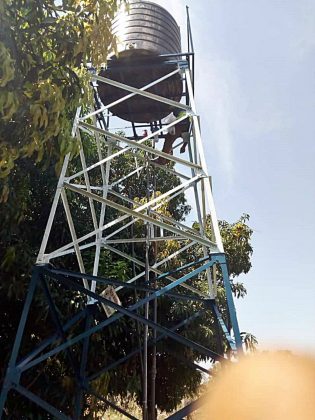 Project Name: Affem Kabyé Health Clinic Borehole Well Water System, Centrale Region, Togo
Project Name: Affem Kabyé Health Clinic Borehole Well Water System, Centrale Region, Togo
The purpose of the borehole water system project at the Affem Kabyé health clinic was to address a lack of both potable and year-round water, either the absence of or nonfunctioning indoor plumbing and the lack of hygienic disposal of afterbirth blood and tissue.
The maternity delivery room was equipped with a sink, faucet and running, potable water, and through additional outside funding; a floor drain and a discharge chamber, both plumbed to a dedicated subsurface cement-lined and ventilated septic tank. Delivery room waste (blood and tissue) can now be dispensed with directly in the maternity room in a safe and hygienic manner, rather than hand-carried by the midwives to an outdoor pit or in many cases poured into the latrines.
Following borehole drilling, a “pump test” was run to determine the well’s productivity and in turn the hydraulic properties of the aquifer. The pump was run for several hours at a rate like actual use and the declining water table (drawdown) was measured at regular intervals. The Affem Kabyé borehole was drilled to a depth of 60 meters and has a yield of 1,300 liters/hour which is more than adequate to supply both the clinic needs and those of the surrounding households. The pump test also indicated a rapid refilling of the borehole, implying even when run at the maximum yield rate, the well should recover quickly and not result in significant lag times. Simply put, the hydraulic conditions of the well are favorable to insure a sustainable water supply for many years to come (assuming the system is well maintained).
Water samples from both the borehole well and the original clinic well were taken and sent to the Regional laboratory in Sokodé, the regional capital, for a complete microbial and inorganic compound analysis. The results of this analysis indicate zero presence of any of the disease-causing bacteria tested (E Coli, Salmonella, Fecal Streptococci, Enterococci and a general category of thermotolerant Coliforms) in the new borehole well.
Numer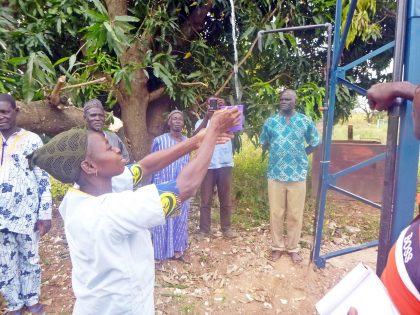 ous visits were made during the well installation by the Water Charity Coordinator and the government hydrologist to oversee construction and to ensure the clinic and community leaders understood the responsibilities associated with maintaining and insuring a sustainable water supply. A final visit by the Regional Director of hydraulics insured the borehole well and the associated delivery system met all the driller’s contract requirements and functionality.
ous visits were made during the well installation by the Water Charity Coordinator and the government hydrologist to oversee construction and to ensure the clinic and community leaders understood the responsibilities associated with maintaining and insuring a sustainable water supply. A final visit by the Regional Director of hydraulics insured the borehole well and the associated delivery system met all the driller’s contract requirements and functionality.
An official technical opening concluded the project with a presentation by the driller on the borehole well components, brief discourses by the Department of Hydraulics Regional Director, village leaders, the Water Charity coordinator, and a representative from the regional ministry of health. As the representative for Water Charity and its donors, the Coordinator reinforced previously discussed themes of maintenance and upkeep through the active participation of a community water committee and a clinic repair account, to manage public access to the well in a non-disruptive manner to the clinic staff and patients, and most importantly to take responsible ownership of this valuable resource.
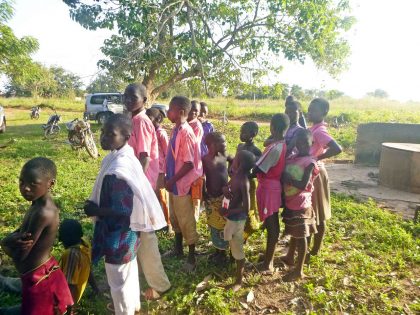 CONCLUSION AND IMPACT:
CONCLUSION AND IMPACT:
The Affem Kabyé clinic serves a population of approximately 4,100 people, including the neighboring villages, who will directly benefit from a more hygienic health clinic. While clearly not all 3,000 people living in Afeem Kabyé will be accessing the well water for personal consumption, the community development liaison estimated perhaps as many as 1,000 inhabitants in time may utilize the well. The clinic anticipates seeing a rise in births as there is now running water and female relatives are no longer obliged to fetch water for the patient, in addition to an overall improvement in hygiene. The clinic staff will use access to potable water to encourage better overall hygiene, as most of the disease-causing bacteria in the community water sources are due to fecal transmission by both animals and humans. The clinic staff will be better protected against blood-borne diseases as afterbirth material (blood and tissue) will be disposed of in a rapid and efficient manner, significantly reducing exposure.
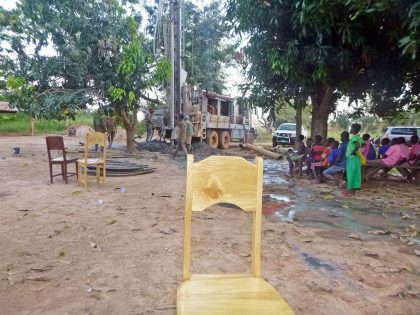 The Regional Director of the Department of Hydraulics stated in his technical report the Affem Kabyé health clinic borehole well water system has fully succeeded in meeting both the local and national objectives for potable water. The Department of Hydraulics, the Ministry of Health and staff at each rural health clinic served by this project have repeatedly been astounded at the expediency with which funding was made available thus allowing work to begin within weeks of submitting the project request. Thank you, donors and Water Charity!
The Regional Director of the Department of Hydraulics stated in his technical report the Affem Kabyé health clinic borehole well water system has fully succeeded in meeting both the local and national objectives for potable water. The Department of Hydraulics, the Ministry of Health and staff at each rural health clinic served by this project have repeatedly been astounded at the expediency with which funding was made available thus allowing work to begin within weeks of submitting the project request. Thank you, donors and Water Charity!
The efficiency of work that followed was due in large part to the incredible efficiency, planning, and hard work by the local drilling company’s crew. The Regional Director and the hydrogeologist at the Department of Hydraulics and Water in Sokodé also contributed their time, vehicle and expertise to insure all technical aspects of the project conformed to modern standards and have assured their continued presence as the borehole wells are now part of the national water database and monitoring program. Having the government of Togo involved from the beginning in this suite of health clinic projects, from the selection of health centers to technical oversight and continued monitoring by the Ministry of Water officials, has confirmed the importance of not doing community projects as isolated NGOs. This last point is critical to continued success as most water projects in Togo are implemented without government oversight, leading to a myriad of problems none the least being poor technical implementation and little to no continued oversight.
The Affem Kabyé project was implemented in concert with five other health center water system projects, scattered over two districts – all of which were completed on schedule. The community of Afeem Kabyé offers its sincere thanks and gratitude to the donor(s) for this valuable water resource. As they say here “l’eau est la vie”. Water is life, and the cleaner the water the longer and more satisfying life will be! Un grand merci!